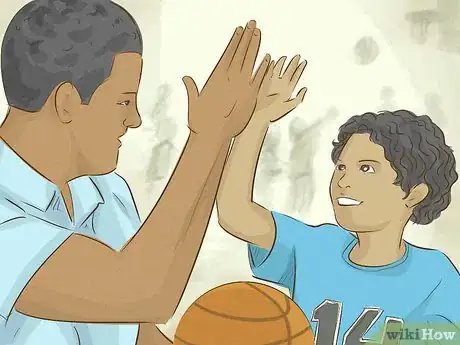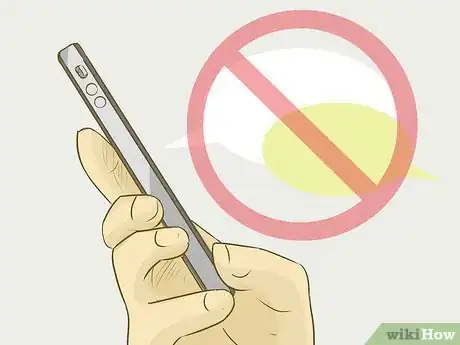This article was co-authored by Trudi Griffin, LPC, MS. Trudi Griffin is a Licensed Professional Counselor in Wisconsin specializing in Addictions and Mental Health. She provides therapy to people who struggle with addictions, mental health, and trauma in community health settings and private practice. She received her MS in Clinical Mental Health Counseling from Marquette University in 2011.
There are 11 references cited in this article, which can be found at the bottom of the page.
This article has been viewed 77,282 times.
The teenage years can be tough for parents. As a single parent, you might struggle with how to effectively raise your teens. It’s a challenge, but you can do it! Learn to deal with your teenagers as a single parent by fostering a connection with them, helping them mature, and getting outside help.
Steps
Interacting with Your Teens
-
1Talk to them regularly. Talking to a teenager can feel like communicating with a brick wall, which is why many parents shy away from it. However, if you don’t communicate with your teens, you miss an opportunity to get to know them better and understand their unique perspectives. Make time to talk to each of your children frequently, one-on-one and as a group.[1]
- Try to make some time to talk to your teens every day, but set aside time each week for a more engaged discussion (no distractions) with them.
- One-on-one talks can be carried out while doing activities together, such as driving your daughter to soccer practice or giving the dog a bath.
- For group talks, use dinner time and family meetings to jumpstart conversations.
- Listen actively and keep it respectful on both sides. Don’t take these conversations as an opportunity to lecture or preach to your teens. Instead, try to get to know them better and understand their point of view.
- Ask questions and encourage them to discuss their opinions thoughtfully. Share your own perspectives, and be supportive.
-
2Skip the lectures. Parents have a tendency to talk down to their teens, which builds a wall between you. Show your teens that you respect them by avoiding condescending lectures. Don’t talk at them, talk with them.[2]
- When you lecture, your kids will shut you out and stop listening. Instead, state your concerns clearly so the central message doesn’t get lost.
- For example, if your teen fails to study for a test and receives a poor grade, ask "What did you learn from this experience?" rather than saying "I told you that you won't be able to keep your grades up without studying."
Advertisement -
3Be a good listener. This may not come naturally for parents, but in order to show your teens consideration, you must be willing to listen. Do so without over-dramatizing what you hear or jumping to conclusions. Try to hear their entire message before reacting.[3]
- Implement a practice of sitting quietly and attentively while your teen talks. Once they are finished, restate what you heard to be sure you got the right message.
- For instance, you might say, “It sounds like you’re saying you’re having trouble making friends at your new school. Am I hearing that right?”
-
4Spend quality time with them. Interactions with your children should be mostly positive. To ensure this, prioritize spending time with them engaging in shared hobbies or chores. When you do this, you increase the odds of your teens feeling comfortable talking to you about the important things.[4]
- As a busy single parent, you may not have much time for hobbies, but you can find small ways to connect. Ask them to help you prepare dinner, exercise together, or read the same books.
- Take advantage of weekends and school holidays to schedule in special bonding activities that you and your kids can do together. For example, maybe over Christmas break, you all can trim the tree or watch classic films together. During summer, you might plan a beach vacation.
- Establish a fun routine, like a weekly “family date night,” and make it a priority for everyone.
-
5Show an interest in their lives. As a single parent, you’ll want to give your teens freedom to explore who they are, but you can still be involved in their world. Learning about their daily lives and interests helps you keep track of who they are becoming. Plus, staying in the loop can also help you spot warning signs of trouble, like falling grades or withdrawing from their friends.[5]
- Get involved in your teen’s life by asking about what’s important to them. Regularly ask questions about school, friendships, relationships, and hobbies.
- Don’t just ask casually without taking it in. Actively engage in the conversation by connecting previous events and remembering names. You might say, "Is your friend Tiffany coming to the swim meet next week? If so, she's welcome to sit with me."
- Invite their friends to your home, so you can know who they are spending time with.
- Reach out to their friends’ parents and try to get to know them. If you have a comfortable connection with the parents of your teen’s friends, it will be easier for you to communicate with them about any concerns that might arise.
Supporting Their Growth
-
1Allow your teens a voice in some of the household rules. As they get older, give your teens an opportunity to take part in setting household rules. Doing so helps them develop maturity and improves cooperation between you. Set clear expectations about appropriate behavior, but give them a voice, too.[6]
- Have your children come up with a list of rules/privileges they think are fair. Create a list of your own items, too. Sit down and go over what each of you have written.
- For example, your teens may ask for a curfew of 9pm and a weekly allowance. You might request that they complete homework and chores daily by 7pm and make themselves available for a family game night each week.
- Negotiate with them to find terms on which you can all agree.
-
2Maintain an open dialogue about the tough topics. If you’re a single parent, you may know how stressful it is to discuss hot topics with your teens. Subjects like sex, drugs, and bullying can feel awkward to talk about. But, if you don’t discuss them with your teens, you leave the door open for them to form opinions on their own.[7]
- Use scenes from teen-friendly TV shows or movies to bring up these topics. Explain your expectations and encourage your teens to use good judgment.
- Afterwards, keep the lines of communication open so that your teens understand you are willing to talk about difficult subjects.
-
3Encourage them to pursue their passions. Help your teens become well-rounded and steer them away from negative influences by supporting their passions. Teens who are driven to perform in other areas outside of school are more likely to make good decisions and avoid trouble.[8]
- Help each of your teens find activities they enjoy, such as sports, music, or creative pursuits. You might do so by researching clubs or organizations at school and in the community that match your teens' interests and suggesting that they check them out.
- As much as your schedule allows, show up to important events and cheer them on.
-
4Give them responsibility. As a single parent, you know you cannot do every imaginable task on your own. Support your teen’s development by delegating some of the responsibility. This may translate to opening a checking account to help them learn to manage money, giving them more chores than younger children, or allowing them to work part-time.[9]
- They will probably make mistakes, but giving them room to make independent decisions will help them grow up.
-
5Respect their privacy. Developing trust with your teens is also important as they get older. Unless they give you good reason to hover, take a step back and respect their privacy. Have faith that you have clearly communicated your expectations and raised your children well.[10]
- Avoid eavesdropping on conversations with friends, searching their rooms, or checking their phones.
- Only invade your teens’ privacy if you suspect something is wrong (like drug or alcohol use).
-
6Set a good example. Your teens learn how to behave by observing you. Be sure that your own actions align with what you preach to your children. Strive to be a good role model by demonstrating a good work ethic, being a compassionate and honest friend, and making healthy lifestyle choices.[11]
Making Use of Resources
-
1Help them find community role models. As the old saying goes, “it takes a village to raise a child.” Just because your children aren’t raised in a 2-parent household doesn’t mean they have to lack good role models. Take an active role in helping them connect with positive examples in your local community.[12]
- Good role models might include relatives, the parents of their peers, coaches, and teachers.
- Think of things your teens have in common with these people that can serve as connection points. Then, you might say, "Josh, did you know that Mr. Carlson is skilled in archery? I told him about your interest and he thought the two of you could go out this weekend and practice. How does that sound?"
- Consider reaching out to an organization like Big Brothers Big Sisters to help connect your teen with a positive role model.
-
2Ask family and friends for help. Your network is a powerful resource when it comes to raising teens. Activate those resources by reaching out to your closest friends and family when you need parenting guidance or time away.[13]
- Get input on decisions and disciplinary practices. Or simply ask someone to pitch in when you need a break.
-
3Encourage your teen to talk to someone their age. Sometimes, teens need someone else their own age to talk to about school, relationships, and everything in between. Support your teen's efforts to confide in peers at school or in their local community. Make sure they have positive influences they can turn to for support.[14]
- You might say, "Rachel, I know you don't really want to talk to me about what's going on with you. I just want to make sure you have someone to talk to. Have you reached out to Beth?"
-
4Join a parent support group. A good sounding board is priceless for parents. As a single parent, you may not have access to someone with whom you can share your worries or fears. For some parents, this translates to over-sharing with their teens. To prevent that from happening, find a good support group of other parents.[15]
- The Parent Leadership Network is one such online group where parents can come together to get support from one another.
- For local groups, inquire with your family doctor's office, library, or church to find out about parent support groups meeting in your area.
-
5Reach out to a counselor. Parenting alone can be difficult, which is why you should speak to a professional counselor when you need additional support. Your counselor can simply act as a non-judgmental ear when you need to vent. They can also help you come up with practical strategies and stress-management techniques to help you be more effective as a parent.[16]
- Ask your family doctor for a referral or look up counselors who serve your local community.
References
- ↑ http://www.ahaparenting.com/ages-stages/teenagers/tips-bond-close-teen
- ↑ https://www.healthychildren.org/English/family-life/family-dynamics/communication-discipline/Pages/How-to-Communicate-with-a-Teenager.aspx
- ↑ https://www.healthychildren.org/English/family-life/family-dynamics/communication-discipline/Pages/How-to-Communicate-with-a-Teenager.aspx
- ↑ http://www.ahaparenting.com/ages-stages/teenagers/tips-bond-close-teen
- ↑ https://www.washingtonpost.com/news/parenting/wp/2015/02/18/five-lessons-for-parenting-a-teenager/?utm_term=.1fe3318b6be9
- ↑ http://www.singleparents.org.uk/parenting/teenagers/family-contract
- ↑ http://kidshealth.org/en/parents/adolescence.html#
- ↑ https://www.washingtonpost.com/news/parenting/wp/2015/02/18/five-lessons-for-parenting-a-teenager/?utm_term=.1fe3318b6be9
- ↑ https://www.psychologytoday.com/blog/surviving-your-childs-adolescence/201111/why-single-parents-can-parent-adolescents-well
- ↑ http://kidshealth.org/en/parents/adolescence.html#
- ↑ http://www.mayoclinic.org/healthy-lifestyle/tween-and-teen-health/in-depth/parenting-tips-for-teens/art-20044693?pg=2
- ↑ https://www.pgeveryday.com/family/teens/article/5-ways-to-connect-your-teen-with-positive-role-models
- ↑ https://www.psychologytoday.com/blog/surviving-your-childs-adolescence/201111/why-single-parents-can-parent-adolescents-well
- ↑ https://www.goodtherapy.org/blog/6-ways-to-help-your-teen-make-keep-great-friends-0701164
- ↑ http://www.singleparents.org.uk/parenting/teenagers/communicating-with-your-teenager
- ↑ https://www.goodtherapy.org/learn-about-therapy/issues/parenting








-Step-1-Version-2.webp)















-Step-19-Version-3.webp)



















































